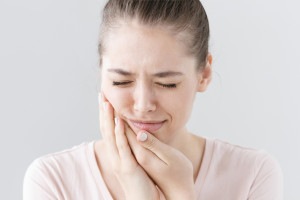 Research by the Journal of the American Dental Association found that 1 in every 8 people suffer from tooth sensitivity. No wonder why Sensodyne toothpaste seems omnipresent these days. If you’re one of the folks who love ice cream but sometimes have to scream, there are things you can do to stop cringing by slurp two.
Research by the Journal of the American Dental Association found that 1 in every 8 people suffer from tooth sensitivity. No wonder why Sensodyne toothpaste seems omnipresent these days. If you’re one of the folks who love ice cream but sometimes have to scream, there are things you can do to stop cringing by slurp two.
The root of the cause
The reason your teeth are sensitive lies within one of two places, or both: your teeth or your gums. When tooth enamel has worn down, the nerves in your teeth become exposed. Meanwhile, if your gums recede far enough, the root of your tooth has its nerves exposed.
Dare we say it? This is why regular brushing and flossing and regular cleanings at the dentist are vital. They keep this sort of decay from happening. In the meantime, here are some ways to mitigate the agony of your teeth.
How you brush
You: I brush my teeth regularly. Why are they sensitive?
Hygienist: You’re brushing too hard.
That’s a common conversation inside dentist offices. So, if you are someone who is taking good care of their teeth, but your teeth are hurting when you eat or drink hot or cold, you are probably brushing too roughly. Consider using an electric toothbrush and letting the brush do the work. Make teeth brushing time, a little more chill.
If you don’t like the idea of an electric toothbrush, make certain the manual brush you use has soft bristles.
How you sleep
Sometimes, it’s not your fault. Tooth sensitivity may be unrelated to your dental care, especially if you grind your teeth when you sleep. There’s no real cure for this, but there are some good “band-aids.”
Mouthguards are one example. They’ll protect your teeth well, but they won’t stop you from doing the grinding. And that can cause jaw pain, which defeats the purpose of pain mitigation. Consider doing some homeopathic tricks to stay more relaxed at night:
- Meditation—There are numerous websites and CDs available that help people go from waking state to meditative state to sound sleep. Try it.
- Wash cloth—Soak a washcloth in warm to hot water and place it over your mouth and jaw. This will help relax the muscles in that area. And do it mindfully. Tell yourself you deserve a calm night of sleep and you just might get that.
What you eat
Take an inventory of what you put in your mouth—from solid food to liquids to treats like gum or candy. The more acid you intake, the more your teeth and gums suffer. Limit foods like hard candy, lemonade and bubble gum. When you do indulge, rinse your mouth out with water and gently brush your teeth. Healthy foods like vinaigrette dressing and citrus are highly acidic too. So follow that same course of action.
What you use
Finally, there’s the toothpaste you are using. Teeth whitening toothpastes are ubiquitous now in supermarkets and with worldwide love of coffee and wine, the need to whiten teeth isn’t going away. Take a close look at the whitening toothpaste you are purchasing. Does it have the American Dental Association Seal of Acceptance?
The ADA recognition means the bleaching ingredients are safer and more gentle than other options available. When dealing with chemical compounds and already sensitive teeth, that stuff matters.
Finally, consider finding a toothpaste for sensitive teeth. Most brands offer it nowadays. Look for enamel strengthening ingredients like potassium nitrate and fluoride. And if getting your teeth whitened is still something you want to pursue, check in with your dentist at your next check up.







Leave a Reply